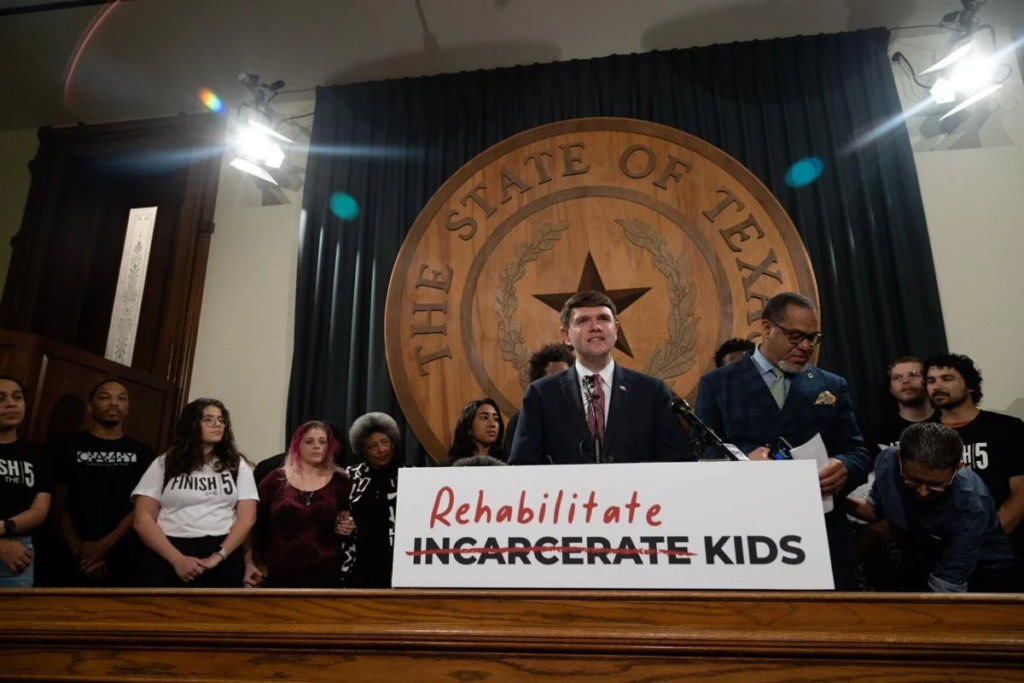A state senator says Texas’ adolescent prison system is flawed and should be shut down after years of child abuse and mistreatment scandals. State Rep. James Talarico introduced legislation Thursday to close the state’s five juvenile prisons and disband the agency that oversees them by 2030.
“For more than a century, kids in Texas child prisons have been beaten, raped and even murdered behind bars,” the Round Rock Democrat said at the state Capitol. “The incarceration that we inflict on our kids causes unimaginable trauma, and it leads kids to be more likely to commit crimes in the future.”
The Texas Juvenile Justice Department
Talarico’s proposal to eliminate child prisons and fund local rehabilitation programs isn’t the only radical option. The Texas Juvenile Justice Department and other lawmakers want more jails to fix the system.
The agency’s five prisons nearly collapsed last year as officers quit in droves, and most new hires left almost immediately. Without adequate staff to supervise nearly 600 youngsters in jails, children were kept in cells for up to 23 hours, often using lunch trays or water bottles as toilets.
Jarvis Johnson tweeted that child prisons are immoral, inhumane, and ineffective. You can see below.
Child prisons are immoral, inhumane, and ineffective.
I’m proud to join my colleague @jamestalarico and these courageous activists to announce the filing of HB 4356, which closes Texas’ 5 remaining youth prisons and creates a new system of rehabilitation, not punishment. #txlege pic.twitter.com/HNmmCAfpwv
— Jarvis Johnson (@jarvisjohnsontx) March 9, 2023
Over half of the imprisoned youth were on suicide watch, harming themselves to escape. After The Texas Tribune reported on the horrific circumstances in August, young justice advocates restarted longtime attempts to abolish juvenile facilities. Screens of Democratic lawmakers unsuccessfully urged Gov. Greg Abbott to summon a special session to address the situation.
The matter is again in the spotlight with lawmakers in session at the Texas Capitol. This week, Republican House Speaker Dade Phelan endorsed state Rep. Joe Moody’s “Closer to Home” initiative to reduce youth incarceration. Establishing a network of community-based rehabilitation and illegal preventive programs like mental health services, mentoring, and after-school activities will divert more adolescents from state prisons.
“Protecting Texas kids has and will continue to be a priority for the Texas House, and I thank Representative Moody for filing this legislation that puts these children on a better track by prioritizing community resources and keeping them closer to their families,” Phelan said in a statement Thursday.
Talarico wants lawmakers to go further. He announced House Bill 4356 to close prisons during a press conference with state Rep. Jarvis Johnson, D-Houston. Former child inmates, kids inspired by the Tribune to advocate for youth jail abolition, a former juvenile prison officer, and other youth justice advocates surrounded the lawmakers.
By 2026, the office would cease youth commitments to state jails and provide alternative programs and imprisonment in each county. The office would fund local community placements and create new diversion and preventive programs, including mental health treatment. According to TJJD, almost 80% of kids in state-run jails needed mental health therapy last year.
Talarico called for a significant change in state policy because earlier reforms failed. To combat sexual, physical, and mistreatment scandals, politicians have renamed and retooled the institution in the previous 20 years.
“That’s $500,000 per child. Half a million dollars could buy you the best therapist, the best counselor, the best tutor,” the lawmaker said. “This money could be spent on doing what works, what we know works, what the evidence tells us works, which is rehabilitating kids so that they can rejoin society.”
TJJD, under federal investigation for alleged abuse and torture, fixed its staffing levels this year after giving officers permanent 15% emergency raises, raising starting salary from $36,000 to nearly $42,000. The government made money by eliminating a youth reentry program and having several vacant posts.
The relative stability has allowed children to leave their quarters and resume another programming. Yet, understaffing keeps a list of minors in overcrowded local jails awaiting admission to TJJD to begin their sentences.
Talarico knows his Senate-unsponsored bill faces a challenging climb. He views it as a starting point to move the needle and is delighted that Phelan is backing Moody’s “Closer to Home” bill, which Talarico said compliments his.
Several lawmakers appear to be taking a different approach. In its crisis, TJJD is under a decennial legislative review, in which politicians assess how and if a state agency should continue. The sunset study criticized the agency but recommended funding increases, not jail closures.

